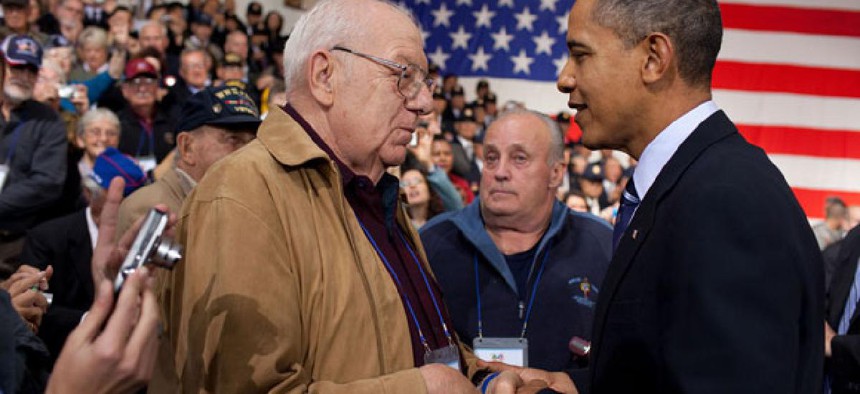
Obama meets with veterans at an event in 2010. Pete Souza/White House
With veterans, Obama plays the long game
Focus on the military at the convention could pay off down the road.
Stereotypes have long cast Democrats as peaceniks and Republicans as sabre-rattlers. But at the 2012 Democratic convention, odes to the military were inescapable, while Republican nominee Mitt Romney didn’t even note in his acceptance speech that the United States was at war.
President Obama isn’t expected to win the military vote, which tends to lean Republican. But the focus at the convention could have a longer-term payoff: bolstering the Democratic Party’s national-security credentials. Thanks to Obama’s most high-profile overseas success -- the killing of Osama bin Laden -- and his outreach to veterans and their families, the old stereotype may be crumbling.
“Veterans and military families are a group that they’ve been assiduously courting for the past four years,” said Peter Feaver, a professor at Duke University’s Sanford School of Public Policy and a former National Security Council official under Presidents George W. Bush and Bill Clinton. Despite that courtship, Feaver said, “Obama probably will not outperform his 2008 numbers.”
Polling continues to track the result of the 2008 election, when veterans favored Sen. John McCain, R-Ariz., by 10 points. McCain, widely respected for surviving captivity during the Vietnam War, drew his strongest support among veterans over age 65, according to exit polls.
A Gallup poll released in May had Romney leading Obama by 24 points among veterans, with Romney’s support also driven largely by older, male voters. But a Reuters/Ipsos poll released the same month found a narrow advantage for Obama among veterans and their families, with 44 percent backing Obama and 37 percent choosing Romney. The Reuters/Ipsos poll, though it was conducted online, is still considered effective in measuring the preferences of younger voters.
“Nobody’s born in uniform. We are a reflection of society,” said Joe Davis, director of public affairs at the Veterans of Foreign Wars. While there’s a perception that most veterans lean right or center-right, the military reflects a range of political leanings, just like the rest of the country, Davis said.
Veterans and their families also aren’t single-issue voters. Like most Americans, their No. 1 worry is the economy. “The president has been true both in word and deed in taking care of military families,” Davis said, but “that’s not the top issue in this election.”
It shouldn’t be surprising that the president has made veterans a priority. Paying attention to veterans during a time of war is “good governance and good civics,” said Michael Breen, vice president of the Truman National Security Project and an Army veteran of both Iraq and Afghanistan. Both the president and the first lady also seem to feel a genuine enthusiasm for the cause.
Breen joined retired Navy Admiral John B. Nathman and other veterans of Iraq and Afghanistan on stage at the Democratic Convention. The moment didn’t feel political. “It was, to me, and incredibly powerful moment of unity and thanks,” he said.
But even though honoring veterans may not feel political, and even though it may not win Obama the military vote, highlighting military service and sacrifice could still benefit Democrats over the long term.
“It’s also a way of showing a rebranding of the Democratic Party,” Feaver said. Rather than being perceived as weak on defense -- a criticism that helped doom Massachusetts Sen. John Kerry’s 2004 presidential bid -- the Democrats want to be seen as smart on defense.
The White House rhetoric on veterans still invites conservative criticism. “The president has an unfortunate tendency to talk about veterans as if they were all disabled,” said Kori Schake, a research fellow at Stanford’s Hoover Institution and a senior policy adviser to McCain in 2008. His language sometimes suggests that “this is just one more community that government programs should reach and assist,” she said.
While Obama and his surrogates talk a lot about ending overseas wars, they don’t often talk about winning them, Schake added. “That distinction actually hugely matters” to current and former service members, she said.
But honoring veterans helps Democrats align themselves with one of the few institutions that most Americans still trust: the military. The feelings of gratitude and national unity returning troops inspire are an echo of Obama’s 2008 pledge to bring the country together. “Honoring the troops is part of the civic religion of the country -- like mom and apple pie,” Feaver said.
To keep hold of the White House, Obama doesn’t necessarily need to win the majority of veteran votes. He needs to win middle-class families in states like Pennsylvania, Florida and Ohio. He needs to win women like Elaine Brye, the beaming military mom who introduced the first lady at the Democratic National Convention.
“I'm not a political person. But I'm a mom, and if someone is there for my family and families like mine, then I'll be there for them,” Brye said. Those are words the Obama campaign wants to resonate in homes across the country -- not just on military bases.






